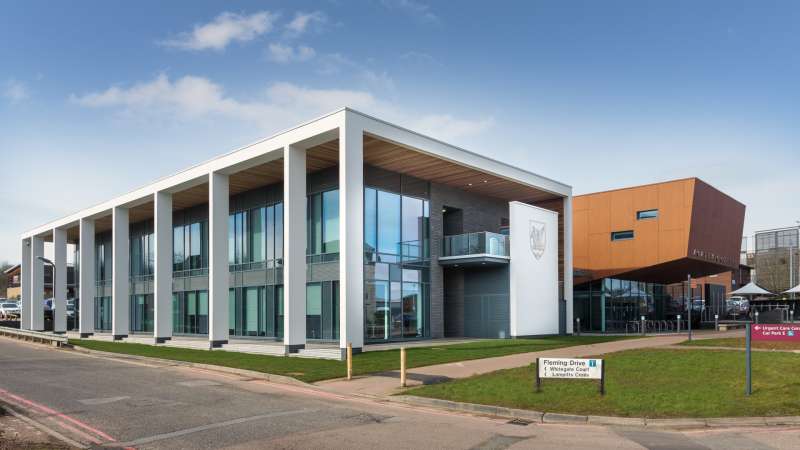The Offsite Guide to MMC in Healthcare

MMC is increasingly being utilised to meet the unique needs and challenges of construction projects within the healthcare sector. There are enormous benefits to using MMC within healthcare as it offers a more cost-effective and efficient solution at a time when healthcare services and budgets are under increasing pressure. In this guide, we explore the scope for MMC in healthcare and consider how it can provide solutions to the unique challenges of this sector.
MMC in healthcare
When thinking of how MMC is used in the healthcare sector, most people would think of traditional volumetric modular buildings with fully integrated services, equipment and finishes. While this is certainly one part of the scope for the use of MMC in healthcare, there is a much wider range of solutions available. These include:
System-build wall panels
Structurally insulated panels (SIPs)
Passivhaus timber frame modular building
Light gauge steel frame (LGSF)
Healthcare pods
Traditional volumetric modular buildings
The different types of MMC that can be used in healthcare projects can be categorised as modular construction, pods and panelised construction. These elements give enormous potential for the scope of MMC in healthcare. It can be used in a wide range of projects and healthcare settings, including:
NHS hospitals
GP surgeries
NHS clinics
Care Homes
Community healthcare facilities
Hospices
Treatment centres
Private hospitals, clinics and healthcare centres
The benefits of MMC in healthcare
MMC offers many benefits within the healthcare industry. Offsite and modular construction ensures that growing demands can be rapidly met while reducing overall costs, build times and disruption to services at sites that are operationally live. In addition, MMC helps to combat concerns around social distancing and sustainability which are important within the healthcare sector.
Cost efficiency
It is well documented that budgets are tight within the healthcare sector. MMC typically comes with reduced costs due to the offsite manufacturing style. This is not because quality is compromised compared with traditional construction practices but rather because the whole process requires less time spent on site. Construction sites are costly to run, so by reducing the time spent on site, costs are naturally reduced.
Reduced build times
MMC significantly reduces build times to ensure that projects can be completed much faster compared to traditional solutions. This helps to keep up with the demands of a growing healthcare sector. Modular buildings can provide both short and long-term solutions, meeting healthcare needs much more efficiently than ever before.
Minimised disruption to services
Many healthcare construction projects take place on working sites where services are being delivered. The use of MMC in these projects helps to minimise disruption to services, patients and healthcare workers. MMC ensures that much of the build process happens offsite so healthcare settings can continue to operate as normal. Projects can then be managed to ensure that the onsite aspects are carried out efficiently and at times that ensure disruption is kept to a minimum.
Social distancing
Since the Covid-19 pandemic, social distancing has remained important within healthcare settings to prevent the spread of infections and protect vulnerable patients. MMC supports social distancing measures because onsite presence is minimal. With modules being designed, produced and quality controlled offsite in factory environments, construction workers spend minimal time on site, which helps to reduce the spread of germs and infections.
Sustainability
MMC offers greater sustainability compared with traditional methods of construction. Many emerging MMC technologies and solutions are utilising low-carbon and recycled products alongside energy-efficient build processes. This supports the drive within healthcare to become more sustainable, such as the NHS ‘Net Zero’ aims to reach net zero emissions by 2040.
Case study: University Hospital Milton Keynes

When a new main entrance area for Milton Keynes University Hospital was required, the NHS Foundation Trust contracted MMC specialists, Catfoss to undertake the project. As the site was a working hospital, the key challenge for Catfoss was to keep disruption to a minimum while the project was carried out. It was essential to maintain access to all departments throughout the construction process.
Using offsite modular construction, Catfoss designed and fabricated the modules offsite in a way they could be successfully transported to the hospital site. This kept onsite disruption to a minimum while ensuring the particular challenges of the build were met effectively and efficiently. The smart application of modular design and construction ensured that the entire project was completed within just nine weeks onsite.
The project was managed effectively to ensure minimal disruption to services, patients and hospital staff. Catfoss first created a temporary pedestrian diversion to maintain access to the hospital while groundworks were being completed. They chose to deliver the modules at a weekend when the hospital was less busy and ensured the internal fit-out was completed concurrently with the external work to reinstate access, pathways and landscaping. The effective planning and management of these key stages ensured the project was completed in the shortest possible timeframe.
You can find out more about this project here.